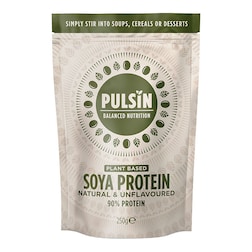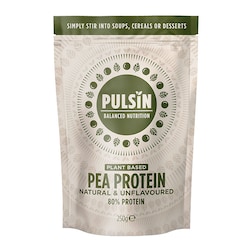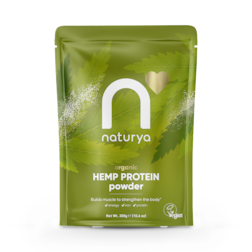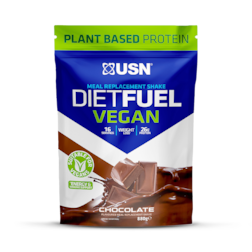15% off €35 or 20% off €45
Code:SUMMER
Your ultimate guide to plant-based protein

Get the complete rundown on plant-based protein with our expert, including how much you need, where to get it and our plant-based protein powders
Summary
1What is plant-based protein?
You probably already know that dietary protein can be found in both animal and plant-based sources…
2Animal protein vs plant-based protein
The key difference between animal protein sources, like meat, fish, eggs and dairy, versus plant-based sources, such as beans, lentils, nuts, seeds…
3Sources of plant-based proteins
“My favourite plant-based complete proteins would be quinoa, soy products, hemp seeds and chia seeds.” says Emily…
Plant-based diets have been popular for a long time now, with many people choosing to reduce or eliminate meat entirely for health, ethical or environmental reasons.
Recent research has shown that a whole-foods, plant-based diet can provide all the protein you need and improve your health and longevity.1-5
“Protein is really important for football players and vegetarians and vegans still have the same protein goals than those who eat animal-based foods,” begins Emily Foster, an in-house nutritionist at H&B.
In our complete guide to plant-based protein, we’ll explore how much you need and how to get it from a plant-based diet. We’ll also reveal the best sources of plant protein and our top four picks for plant-based protein powders.
What is plant-based protein?
Alongside carbohydrates and fat, protein is one of three essential macronutrients for our health. Protein has many functions, including promoting cell and tissue growth, helping to maintain and build healthy muscles and bones and supporting our immune systems.6
“A few of my favourite proteins are called “complete proteins”, which contain all essential amino acids. We have ones which the body can produce themselves. But then we have ones which we have to consume from diet and to be able to promote muscle repair, recovery and growth,” says Emily.
“Some foods will contain all essential amino acids, whereas other foods you'll have to pair with foods that contain different types of essential amino acids to be able to achieve a complete protein.”
You probably already know that dietary protein can be found in both animal and plant-based sources.7 But is there any difference in the quality of animal and plant-based protein? Let's find out.

Animal protein vs plant-based protein
The key difference between animal protein sources, like meat, fish, eggs and dairy, versus plant-based sources, such as beans, lentils, nuts, seeds and whole grains, comes down to their amino acid profile.1,2
Proteins are made up of 20 amino acids – nine of which are essential, because our body can’t make them.1,2,8
Some plant-based proteins do not contain as many essential amino acids1,2,8 However, there’s a simple way to overcome this when following a plant-based diet. By eating a wide variety of different plant-based proteins throughout the day, you can ensure that you get adequate amounts of all nine essential amino acids.1,9
Furthermore, some studies have found that plant-based protein sources are typically lower in saturated fat, sodium and cholesterol than animal sources, meaning that cutting meat out of your diet may contribute to weight loss and better cardiovascular health.3,4,7,11,12
How much protein do you need?
The average healthy adult needs around 0.8–1g of protein per kg of body weight per day.13
However, a number of things may increase your protein needs, such as your activity level and health – strength and endurance athletes are advised to consume more protein (around 1.2-2.0g of protein) as do people who are unwell or recovering from an operation (closer to 1.5g per kg).13,14,15
You may also want to consume more than the recommended amount of protein for several reasons:
- protein helps build and repair muscles, so you should increase your daily protein intake if you want to improve your athletic performance and strength (while still having enough carbs and fibre)16,17
- a high-protein meal or snack can leave you feeling fuller for longer, which may mean you’re more likely to opt for healthier choices when snacking and prevent you from over-snacking18,19
- a high-protein diet may help you lose weight and improve your body composition in combination with a balanced diet18,20
Sources of plant-based proteins
If you follow a plant-based diet, there’s a wide variety of plant-based foods that are rich in protein for you to choose from.21
“My favourite plant-based complete proteins would be quinoa, soy products, hemp seeds and chia seeds.” says Emily.
“For combinations, rice and beans are a good pairing. Rice is really low in an essential amino acid called lysine, but it's high in methionine, whereas beans are the opposite. So if you consume your rice and your beans together you create a complete protein.”
Soy products are high-quality protein sources made from soya beans. They’re thought to contain all nine essential amino acids, meaning they’re a source of complete protein.22
Products made from soy include:23,24
- tofu
- tempeh
- edamame
- soya milk
- textured vegetable protein
Pulses are the dried seeds of legumes. They’re a nutrient-dense food high in protein, fibre, vitamins and minerals.25
Pulses are an inexpensive and healthy way to incorporate more protein into your diet.
Examples include:25
- white beans
- black beans
- kidney beans
- chickpeas
- lentils
- peas
Nuts and seeds are another great way to boost your protein intake. These calorie and nutrient-dense foods provide a good serving of protein, healthy fat and fibre.26
Some of the best choices of nuts and seeds include:26
- hemp seeds
- pumpkin seeds
- peanuts
- almonds
- cashew nuts
- chia seeds
- walnuts
- hazelnuts
Most people think of whole grains as an important source of carbohydrates, but they’re also a source of dietary fibre and can provide a moderate amount of protein.27
The following whole-grain foods include a good serving of protein:28
- oats
- buckwheat
- quinoa
- millet
- whole-grain bread
- brown rice
You may be surprised to find out that you can also find plant-based protein in some vegetables.21
Another excellent protein source is seitan, which is made from wheat gluten.29 Seitan is a complete protein that can be used as a meat replacement, but you should avoid it if you have coeliac disease or a sensitivity to gluten.30,31
Other notable sources of protein can include:
- nutritional yeast33
- mycoprotein (Quorn)34
- spirulina35
Our favourite plant-based protein powders
Eating a varied and abundant diet is the best way to hit your protein goal. But if you want to increase your daily protein, a plant-based protein supplement can boost your overall daily protein intake.36
Here are our top picks for plant-based protein supplements.
Our pick for soy protein powder
Soy protein powder is thought to be a complete protein that can boast some impressive benefits:
- it contains all nine essential amino acids37
- it has a high percentage of protein37
- it’s rich in isoflavone, which may contribute to a reduction of hot flushes in menopausal women 38
Soya Protein Powder from Pulsin is a versatile vegan protein powder with 90% protein content. This unflavoured protein powder has no added sugar or sweeteners, meaning you can add any flavours you wish to make a healthy protein shake tailored exactly to your taste.
Our pick for pea protein powder
Made by isolating the protein of yellow peas from their natural carbohydrates and fats, pea protein powder:39
- contains all nine essential amino acids
- has a high percentage of protein
- can be easily digestible
Pea Protein Powder from Pulsin is a high-quality hypoallergenic protein powder containing a balanced supply of amino acids and an 80% protein level. It’s the perfect alternative for people wishing to avoid dairy and soya-based proteins due to food allergies or intolerance. It’s also gluten and GM-free.
Our pick for hemp protein powder
Hemp protein powder is made from pressed and ground seeds from the hemp plant. This process removes most of the fat while keeping all of the essential amino acids and a small amount of essential fats and fibre.40
Hemp protein powder can be:
- rich in fibre40
- high in protein40
- a source of omega 341
Organic Hemp Protein Powder from Naturya is a fine, protein-dense powder with an earthy flavour. There’s no added flavouring, so it can be added to smoothies, energy bars, pastries or soups for an added boost of protein, vitamins and minerals.
Our pick for diet plant-based protein powder
Diet plant-based protein powders have enough protein per serving to be used once a day to substitute a meal.
A diet plant-based protein powder may help you:
- lose weight42
- improve weight-related disease risk factors43
- meet your daily protein goals
Diet Fuel Vegan Meal Replacement Shake from USN contains 26g of protein made from a blend of pea protein isolate, soya protein isolate and rice protein concentrate. It also contains vitamin B12 and iron to support energy levels.44
The final say
Protein is an essential macronutrient that helps build healthy muscles and bones and support our immune system.6 You can get more than enough protein from a plant-based diet by eating a wide variety of soy products, pulses, nuts, seeds and whole grains – all of which are rich sources of protein, fibre, carbohydrates, vitamins and minerals.6,7
Although it takes careful planning, a plant-based diet can meet all your nutritional needs.1,2 Eating a wide variety of plant-based foods ensures you get all the essential amino acids and nutrients your body needs.1,2
The advice in this article is for information only and shouldn’t replace medical care. While we strive for accuracy and balance, please be aware that this article may discuss products available for purchase through Holland & Barrett. Please check with your GP or healthcare professional before trying any supplements, treatments or remedies. Food supplements mustn’t be used as a substitute for a varied and balanced diet and a healthy lifestyle.
1. Mariotti F, Gardner CD. Dietary protein and amino acids in vegetarian diets–A review. Nutrients. 2019;11(11):E2661. https://doi.org/10.3390/nu11112661
2. Hertzler SR, et al. Plant proteins: Assessing their nutritional quality and effects on health and physical function. Nutrients. 2020;12(12):3704. https://doi.org/10.3390/nu12123704
3. Kim H, et al. Plant‐based diets are associated with a lower risk of incident cardiovascular disease, cardiovascular disease mortality, and all‐cause mortality in a general population of middle‐aged adults. J Am Heart Assoc. 2019;8(16):e012865. https://doi.org/10.1161/JAHA.119.012865
4. Salehin S, et al. Plant based diet and its effect on cardiovascular disease. Int J Environ Res Public Health. 2023;20(4):3337. https://doi.org/10.3390/ijerph20043337
5. 5Herpich C, et al. Role of plant-based diets in promoting health and longevity. Maturitas. 2022;165:47–51. https://doi.org/10.1016/j.maturitas.2022.07.003
6. British Nutrition Foundation. Nutrition information about protein and plant-based protein [Internet]. [cited 2024 May 7]. Available from: https://www.nutrition.org.uk/nutritional-information/protein/
7. European Food Information Council. Plant-based protein: All you need to know to get enough of it [Internet]. [cited 2024 May 7]. Available from: https://www.eufic.org/en/whats-in-food/article/plant-based-protein-all-you-need-to-know-to-get-enough-of-it
8. LaPelusa A, Kaushik R. Physiology, Proteins [Internet]. Nih.gov. StatPearls Publishing; 2022 [cited 2024 Jul 24]. Available from: https://www.ncbi.nlm.nih.gov/books/NBK555990/
9. Gardner CD, et al. Maximizing the intersection of human health and the health of the environment with regard to the amount and type of protein produced and consumed in the United States. Nutr Rev. 2019;77(4):197–215. https://doi.org/10.1093/nutrit/nuy073
10. Salehin S, et al. Plant based diet and its effect on cardiovascular disease. Int J Environ Res Public Health. 2023;20(4):3337. https://doi.org/10.3390/ijerph20043337
11. Tran E, et al. Effects of plant-based diets on weight status: A systematic review. Diabetes Metab Syndr Obes. 2020;13:3433–48. https://doi.org/10.2147/DMSO.S272802
12. Ivanova S, et al. Plant-based diet as a strategy for weight control. Foods. 2021;10(12):3052. https://doi.org/10.3390/foods10123052
13. Wu G. Dietary protein intake and human health. Food & function [Internet]. 2016 Jan 1 [cited 2024 Jul 24];7(3):1251–65. Available from: https://pubs.rsc.org/en/content/articlelanding/2016/fo/c5fo01530h
14. British Nutrition Foundation. Sport and exercise [Internet]. [cited 2024 May 15]. Available from: https://www.nutrition.org.uk/creating-a-healthy-diet/sport-and-exercise
15. Deer R, Volpi E. Protein Requirements in Critically Ill Older Adults. Nutrients [Internet]. 2018 Mar 20 [cited 2024 Jul 24];10(3):378–8. Available from: https://www.ncbi.nlm.nih.gov/pmc/articles/PMC5872796/
16. Carbone JW, Pasiakos SM. Dietary protein and muscle mass: Translating science to application and health benefit. Nutrients. 2019;11(5):1136. https://doi.org/10.3390/nu11051136
17. Jäger R. International Society of Sports Nutrition position stand: Protein and exercise. J Int Soc Sports Nutr. 2017;14:20. https://doi.org/10.1186/s12970-017-0177-8
18. Westerterp-Plantenga MS, et al. Dietary protein – Its role in satiety, energetics, weight loss and health. Br J Nutr. 2012;108(S2):S105–12.https://doi.org/10.1017/S0007114512002589.
19. Gwin JA, Maki KC, Leidy HJ. Increased Protein Consumption during the Day from an Energy-Restricted Diet Augments Satiety but Does Not Reduce Daily Fat or Carbohydrate Intake on a Free-Living Test Day in Overweight Women. The journal of nutrition/The Journal of nutrition [Internet]. 2017 Dec 1 [cited 2024 Jul 24];147(12):2338–46. Available from: https://www.sciencedirect.com/science/article/pii/S0022316622106358#
20. Moon J, Koh G. Clinical evidence and mechanisms of high-protein diet-induced weight loss. J Obes Metab Syndr. 2020;29(3):166–73. https://doi.org/10.7570/jomes20028
21. Langyan S, et al. Sustaining protein nutrition through plant-based foods. Front Nutr. 2022;8:772573. https://doi.org/10.3389/fnut.2021.772573
22. Qin P, Wang T, Luo Y. A review on plant-based proteins from soybean: Health benefits and soy product development. J Agric Food Res. 2022;7(7):100265. https://www.sciencedirect.com/science/article/pii/S2666154321001678
23. Qin P, Wang T, Luo Y. A review on plant-based proteins from soybean: Health benefits and soy product development. Journal of Agriculture and Food Research [Internet]. 2022 Mar 1 [cited 2024 Jul 24];7:100265–5. Available from: https://www.sciencedirect.com/science/article/pii/S2666154321001678
24. Carneiro R, Duncan S, O’Keefe S, Yu D, Huang H, Yin Y, et al. Utilizing Consumer Perception of Edamame to Guide New Variety Development. Frontiers in Sustainable Food Systems [Internet]. 2021 Jan 18 [cited 2024 Jul 24];4. Available from: https://www.frontiersin.org/journals/sustainable-food-systems/articles/10.3389/fsufs.2020.556580/full
25. Didinger C, Thompson HJ. The role of pulses in improving human health: A review. Legume Sci. 2022. https://doi.org/10.1002/leg3.147
26. Balakrishna R, et al. Consumption of nuts and seeds and health outcomes including cardiovascular disease, diabetes and metabolic disease, cancer, and mortality: An umbrella review. Adv Nutr. 2022;13(6):2136–48. https://doi.org/10.1093/advances/nmac077
27. Poutanen KS, et al. Grains – A major source of sustainable protein for health. Nutr Rev. 2021;80(6):1648–1663. https://doi.org/10.1093/nutrit/nuab084
28. Wholegrains [Internet]. Heartuk.org.uk. 2023 [cited 2024 Jul 24]. Available from: https://www.heartuk.org.uk/low-cholesterol-foods/wholegrains-
29. Lima M, et al. A narrative review of alternative protein sources: Highlights on meat, fish, egg and dairy analogues. Foods. 2022;11(14):2053. https://doi.org/10.3390/foods11142053
30. Hossein Akhondi, Ross AB. Gluten and associated medical problems.Treasure Island (FL): StatPearls Publishing; 2019. [cited 2024 May 7]. Available from: https://www.ncbi.nlm.nih.gov/books/NBK538505/
31. Alternatives to meat for halting the stable to table continuum – an update. Arab Journal of Basic and Applied Sciences [Internet]. 2020 [cited 2024 Jul 24]; Available from: https://www.tandfonline.com/doi/full/10.1080/25765299.2020.1807084
32. Alternatives to meat for halting the stable to table continuum – an update. Arab Journal of Basic and Applied Sciences [Internet]. 2020 [cited 2024 Jul 24]; Available from: https://www.tandfonline.com/doi/full/10.1080/25765299.2020.1807084
33. Jach ME, et al. Yeast protein as an easily accessible food source. Metabolites. 2022;12(1):63. https://doi.org/10.3390/metabo12010063
34. Finnigan TJA, et al. Mycoprotein: The future of nutritious nonmeat protein, a symposium review. Curr Dev Nutr. 2019;3(6):nzz021. https://doi.org/10.1093/cdn/nzz021
35. AlFadhly NKZ, et al. Trends and technological advancements in the possible food applications of spirulina and their health benefits: A review. Molecules. 2022;27(17):5584. https://doi.org/10.3390/molecules27175584
36. Ambulkar P, et al. Efficacy and safety assessment of protein supplement–micronutrient fortification in promoting health and wellbeing in healthy adults – A randomized placebo-controlled trial. Transl Clin Pharmacol. 2023;31(1):13–27. https://doi.org/10.12793/tcp.2023.31.e1
37. Qin P, et al. A review on plant-based proteins from soybean: Health benefits and soy product development. J Agric Food Res. 2022;7(7):100265. https://doi.org/10.1016/j.jafr.2021.100265
38. Ahsan M, Mallick AK. The effect of soy isoflavones on the menopause rating scale scoring in perimenopausal and postmenopausal women: A pilot study. J Clin Diagn Res. 2017;11(9):FC13–6. https://doi.org/10.7860/JCDR/2017/26034.10654
39. Shanthakumar P, et al. The current situation of pea protein and its application in the food industry. Molecules. 2022;27(16):5354. https://doi.org/10.3390/molecules27165354
40. Chen H, et al. Emerging natural hemp seed proteins and their functions for nutraceutical applications. Food Sci Hum Wellness. 2023;12(4):929–41. https://doi.org/10.1016/j.fshw.2022.10.016
41. Teh SS, Birch J. Physicochemical and quality characteristics of cold-pressed hemp, flax and canola seed oils. J Food Compos Anal. 2013;30(1):26–31. https://doi.org/10.1016/j.jfca.2013.01.004
42. Noronha JC, et al. Meal replacements for weight-related complications in type 2 diabetes: What is the state of the evidence? Front Endocrinol (Lusanne). 2022;13:875535. https://doi.org/10.3389/fendo.2022.875535
43. Heymsfield SB, et al. Weight management using a meal replacement strategy: Meta and pooling analysis from six studies. Int J Obes. 2003;27(5):537–49. https://doi.org/10.1038/sj.ijo.0802258.
44. Tardy AL, et al. Vitamins and minerals for energy, fatigue and cognition: A narrative review of the biochemical and clinical evidence. Nutrients. 2020;12(1):228. https://doi.org/10.3390/nu12010228








